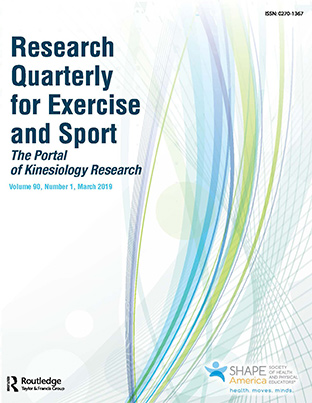 RQES Table of Contents
RQES Table of Contents
Parental Behavior, Cognitive Appraisal, and Motivation in Young Athletes
A. Rui Gomes, A. Manuela Goncalves, Olga Dias, & Catarina Morais

Sports psychologists have tried to understand how sports can promote psychological growth and positive development in youth (Pierce, Gould, Cowburn, & Driska, 2016; Vealey & Chase, 2015). Extant data show that participation in youth sports represents an opportunity to learn social skills, values, attitudes, and motivational styles (Schwebel, Smith, & Smoll, 2016). However, to change opportunities into achievements, researchers need to understand the several factors that can turn these opportunities into positive or negative experiences, including how young athletes perceive their sports activities. Some factors are social; they include parental behaviors (Fredricks & Eccles, 2004), peer influences (Jõesaar, Hein, & Hagger, 2011), and coach-athlete relationships (Smith, Smoll, & Cumming, 2007; Stein, Bloom, & Sabiston, 2012). Other factors are psychological and they include motivation and goal orientation as stressed by Achievement Goal Theory (Ames, 1992; Nicholls, 1989) and Self-Determination Theory (Deci & Ryan, 2002).
These indications reinforce the idea that positive development of young athletes dependents of multiple combination of psychosocial factors. As Magnusson and Stattin (2006) claimed, over-reliance on single dimensions or factors hinders our understanding of the psychological growth of young people. It follows that, to understand how psychological development may be promoted by sports, we need to consider multiple dimensions and coordinate multiple constructs (Bengoechea, Sabiston, & Wilson, 2015). This multidimensional approach is illustrated in current studies dealing with the impact of coaches, parents, and peers on young athletes’ psychological well-being (Atkins, Johnson, Force, & Petrie, 2015; Jõesaar et al., 2011).
In this article, we focus on parents, a major influence in youth sports (Fredricks & Eccles, 2004). Parents represent the typical agent of the education and socialization of their children, with the capacity to influence their personal and social development (Knight, Dorsch, Osai, Haderlie, & Sellars, 2016; Pomerantz & Thompson, 2008). Previous research has shown that parents can have a positive impact when athletes perceive parental behaviors as encouragement, support, and praise; in contrast, parents can have a negative impact when their behaviors are perceived as unreasonably demanding, performance pressure, and criticism directed to sports failures (Knight, Boden, & Holt, 2010; Knight, Neely, & Holt, 2011).
To read the rest of this article, click here to download a pdf.